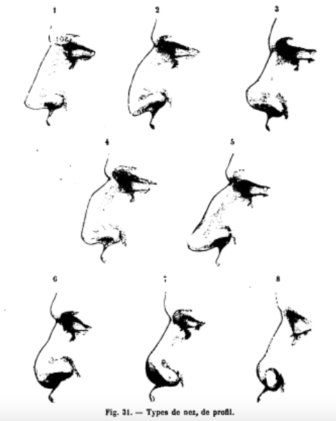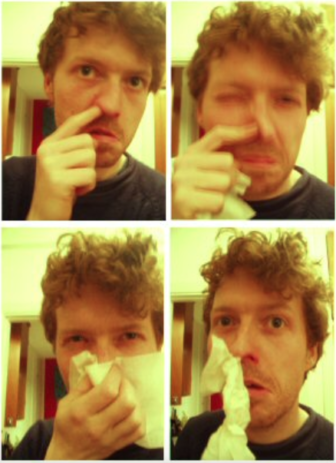Connecticut’s wet winter will unleash a flood of pollen this spring season. Sniffles, sneezes and sore throats may be triggered by allergies, but how can you tell if it’s a cold, sinus infection or the flu instead?
Physicians at American Family Care (AFC), expect to see scores of suffering patients seeking relief from sinus symptoms.

Nose shapes used in Paul Topinard’s nasal index (19th century).
— an announcement from American Family Care (illustrations added by Darienite.com)
“Nasal allergy symptoms and common cold symptoms are essentially identical,” explains Dr. Ifthikar Ali, medical director for several AFC Connecticut locations. “Variables we examine are exposure to an allergen, like pollen or a pet, the duration of symptoms — months versus 1 to 2 weeks, and if there is improvement while taking allergy medications.”
Spring allergies will cause itchy water eyes, runny nose, scratchy throat, wheezing, coughing and even hives. The symptoms of a cold are often characterized by runny nose, sore throat and cough. A distinguishing factor might be that in some upper respiratory infections commonly known as colds, the patient will also have a fever, malaise (feel bad) and muscle aches.

Wikimedia Commons
Illustrating various methods of expelling nasal mucus (mostly rude)
Acute sinusitis is characterized by a stuffy or runny nose accompanied by pain in the forehead and/or over the cheeks. If severe enough, there can also be a fever. The nasal discharge may be very yellow. If there is swelling of the nasal passages due to allergies or common cold, which prevent the sinuses from draining, then this may lead to sinusitis. Acute sinusitis can be treated with antibiotics.
A doctor’s diagnosis is the only way to truly determine the source of the illness. AFC urgent care centers are a convenient, affordable alternative to the emergency room providing quick, immediate medical care.
If the problem is allergies, Dr. Ali recommends long-acting, non-sedating oral antihistamines such as Zyrtec, Xyzal, Allegra or Claritin. Over the past several years, nasal steroid sprays such as Flonase and Nasacort have become available over the counter.

Picture by User:Javier Carro on Wikimedia Commons
This painting, “Nimm dich selbst bei der Nase,” is said to illustrate the German proverb “Take yourself by your nose.” We tried to find out what that means, but we still don’t nose. (late 17th c., Tyrolean Folk Art Museum)
“Nasal steroid sprays are a lot more effective then antihistamines,” states Dr. Ali. “They have an effect on the actual allergy cells in your nose, therefore improving all of your nasal symptoms caused by allergies. Antihistamines only help with decreasing the effect of histamine.”
However, Dr. Ali warns that nasal decongestant sprays such as Afrin, can cause physical dependence in as little as two to three days of use, i.e. your nose becomes addicted to Afrin.
For those who are seeking a natural treatment for any type of sinus congestion, Dr. Ali recommends nasal saline sprays or rinses like Neti Pots. “They help clear out all of the allergens in your nasal passages are that triggering symptoms, wash out mucus and decrease swelling of the nasal tissues. Nasal saline rinses are safe and effective and have been around for centuries.”
Dr. Ali offers the following ways to reduce allergic reactions:
- Avoid the allergy source – don’t open the windows, don’t hang clothes outside to dry.
- Wear sunglasses outside to keep pollen out. Avoid rubbing your eyes and avoid wearing contact lenses. Use artificial tears.
- Drink extra fluids.
- Wash your hands and clothes after playing with a dog or being outside.
- Check the daily pollen count at the National Allergy Bureau of the American Academy of Allergy Asthma & Immunology website — and limit time spent outdoors when it’s high.
“The critical first step is to identify what is causing the problem,” said Dr. Ali. “From there you can find the best treatment to relieve the symptom while trying to prevent the cause of the illness.”
AFC locations are open Monday through Friday from 8 a.m. to 8 p.m. and weekends from 8 a.m. to 5 p.m. No appointment is required. Danbury locations are at 2 Main St., 100 Mill Plain Road and 76C Newtown Road.


